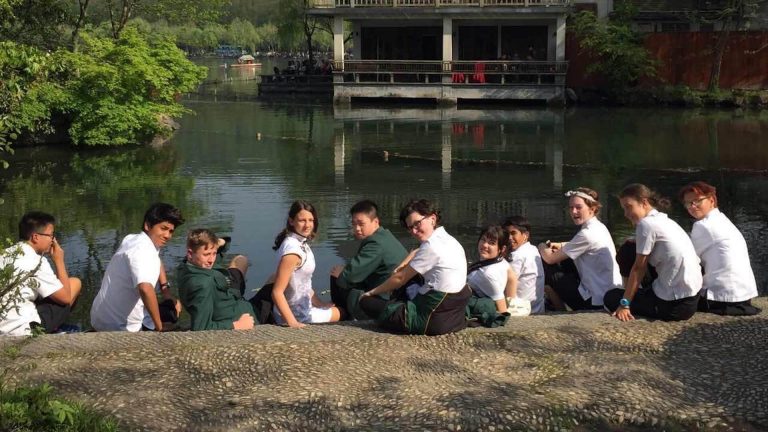In the Arts learning area, students develop creative skills, critical appreciation and knowledge of artistic techniques and technologies in dance, drama, media, music, visual arts and combinations of art forms.
Why Arts subjects enhance the learning experience
The Arts provide young people with authentic and meaningful learning experiences that engage their minds, hearts, and bodies. The Arts regularly engage multiple skills and abilities, nurturing the development of a wide range of cognitive, social, and personal competencies.
Facilities
The facilities at Melville SHS are state-of-the-art. Computers, a 3D printer, cameras and video equipment are just some of the technologies available. The Performing Arts Centre is an incredible performance space for dance, drama and music showcases and is used on a daily basis.
Awards and Highlights
Melville SHS is a regular award winner in visual arts. Here are some highlights:
- “Perspectives” exhibition at AGWA – three winners in two years
- Southern Perspectives exhibitors
- Shaun Tan Art award – regular place getters
- Royal Show National Photographic Exhibition
- Young Originals Exhibition
- The Crime Prevention Through Environmental Design Award Winners
- City of Melville Sculpture Walk winners
- Perth Black Swan had two students selected to exhibit
- St George Art Awards commendations
- Canning Art Awards – winners
- Atwell Art Awards – winners
- Doodle for Google competition – winners
- Melville Art Awards – winners
- Metamorphosis exhibition
- City of Melville National Youth Week Photographic Exhibitions
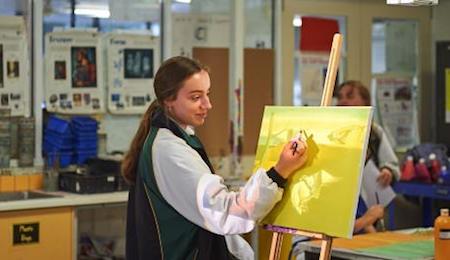
Highlights of our music and dance programs include:
- Music tour to Melbourne and New Zealand
- Swing band performances
- Music brunch
- A variety show with 84 students involved
- Twilight concert
- Four bands performing in IMSS festivals
- South of the River Dance Festival
See Interview with Madeline Waller who was a 2014 Perspectives Exhibition finalist at AGWA (go to Minute 1.25).
It is through the study of English that individuals learn to analyse, understand, communicate with and build relationships with others, and with the world around them. The study of English helps young people develop the knowledge and skills needed for education, training and the workplace. It helps them become ethical, thoughtful, informed and active members of society. English plays an important part in developing the understanding, attitudes and capabilities of those who will take responsibility for Australia’s future.
Although Australia is a linguistically and culturally diverse country, participation in many aspects of Australian life depends on effective communication in Standard Australian English. English also helps students to engage imaginatively and critically with literature to expand the scope of their experience. Aboriginal and Torres Strait Islander peoples have contributed to Australian society and to its contemporary literature and its literary heritage through their distinctive ways of representing and communicating knowledge, traditions and experience. English course work values, respects and explores this contribution. It also emphasises Australia’s links to Asia.
The English curriculum is built around interrelated strands and teaching and learning programs balance and integrate all strands. Programs focus on developing students’ knowledge, understanding and skills in listening, reading, viewing, speaking, writing and creating. Learning in English builds on concepts, skills and processes.
ESL English is a flexible program of instruction for language and literacy development, designed to assist students whose first language is not English. ESL classes are formed in Years 8, 9 and 10 as required. Newly arrived students are eligible for ESL studies during their first 3 years in Australia.
ESL education caters for those students who have recently arrived in Australia from a non-English speaking country or those who have recently exited from an Intensive English Centre (IEC). At each year level, students are encouraged to take advantage of ESL provision to improve and consolidate their English language and literacy skills. Being a competent user of English is essential for success at school.
ESL is not a modified mainstream English course but rather focuses on improving oral and written language skills across a range of English texts and subject area content. In particular, ESL studies are designed to help students with basic aspects of English such as:
* pronunciation
* spelling
* vocabulary development
* grammar
* sentence construction
* paragraph organisation
* whole text construction
ESL classes are small and students are assisted individually to ensure improvement and develop confidence.
In Years 8 and 9, ESL teachers focus on improving students’ Standard Australian English skills in preparation for WAMSE and NAPLAN testing. Grades achieved by students are based on each student’s progress against the ESL/ESD progress maps in the four language modes: speaking, listening, reading/viewing and writing. All lower school ESL programs are designed to effectively prepare students for achieving their WACE through participation in the English as an Additional Language (EAL) stage 1, 2, 3 units.
In Year 10, ESL students are involved in the Oracy Australia speaking program. In this program students prepare a small number of oral language tasks (e.g. talk accompanied by a power point; role play; reading a passage) which are presented and assessed by a trained external Oracy Australia assessor. This helps to prepare students for upper-school EAL course units where all semester exams (and the TEE exam) contain an oral examination.
Finally, ESL classroom programs will assist learners to develop key cultural and social understandings by discussing, watching, reading and responding to a range of Australian fiction and non-fiction texts across a range of common school genres (e.g. persuasive and argumentative texts, documentary, report, journal writing etc.).
Health and Physical Education Learning Area outcomes are linked to the progressive development of a healthy, active lifestyle for students. Students progress through high school developing knowledge about living and thriving under a healthy lifestyle. Students also utilise time in the Health and Physical Education Learning area to develop self-management skills based on informed decision-making.
The Health and Physical Education Learning Area encourages each student to achieve a healthy, active lifestyle. Outcomes are predominantly addressed through learning in such areas as Health Education, Physical Education, Outdoor Education, Sport and Dance. Melville SHS encourages participation in sports, both during school time and after school.
Interschool Sports Medical Form
The link below is to a medical form intended for the use of students participating in Interschool sports. The information is required for each student attending any sporting event. It will assist the school and supervising teachers in the preparation, planning and safe conduct of the excursion.
Please email the form to Felicity.Osullivan@education.wa.edu.au.
At the moment, this form will be kept on record for and Health and Physical Education excursions only.
Activity Examples
All School Activities
- House Swimming Carnivals
- House Athletics Carnivals
- House Touch Rugby
Interschool Sporting Teams
- Interschool Lightning Carnivals
- Singapore Netball Tour
- South West Netball Tour
- High School Cup Netball: 6 teams
- Interschool Swimming B Division
- Interschool Athletics Carnival – A Division
- Interschool Cross Country
- AFL: Junior and Senior
- Touch Rugby: Junior Boys, Junior Girls, Senior Boys, Senior Girls
- Soccer: Junior Boys, Senior Girls, Senior Boys, Junior Girls
- Basketball: Junior Boys, Junior Girls, Senior Boys
- Hockey: Junior and Senior mixed teams
- Years 8-10 Interschool Badminton Competition
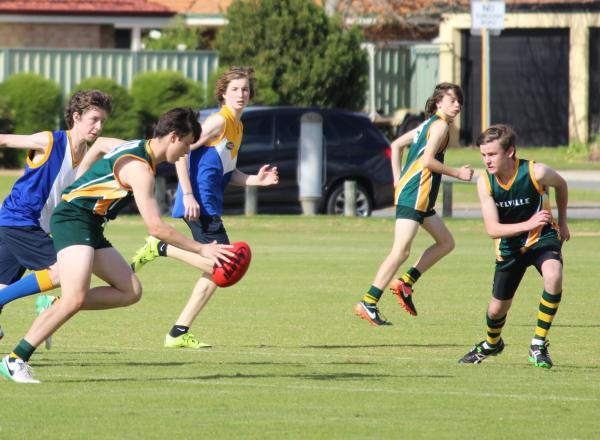
The Humanities and Social Sciences (HASS) learning area develops students’ understandings of how and why individuals and groups live together; how they interact with and within their environment; manage resources; and create institutions and systems.
HASS involves the study of History, Geography, Economics and Business and Civics and Citizenship.
Students gain an understanding that relationships and interactions between individuals and groups change to varying degrees over time. We teach processes of social inquiry, environmental appraisal, ethical analysis and skills to constructively critique various perspectives from past and present contexts. Students are encouraged to apply their understandings and skills in their own lives, in developing environmental consciousness, social competence and civic responsibility.
In HASS, students will investigate and learn about:
- The environment and how humans impact on it
- Sustainability
- Aboriginal and Torres Strait Islander cultures and history
- Asia
- Australian political systems
- Australia’s role in modern history
- National and international economic systems
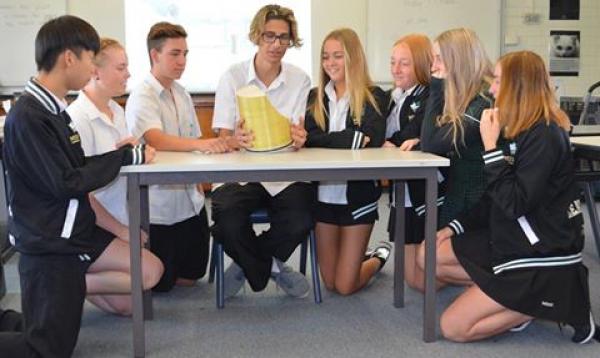
Studying HASS helps students understand how particular social, cultural, economic and environmental issues define peoples’ life experiences. Knowledge of these events helps students to develop the ability to contribute to our culturally diverse society as rational and informed citizens. Students will learn relevant concepts and ideas from people renowned in their fields of expertise, ensuring an interesting and diverse teaching and learning experience.
Benvenuti! Huānyíng! Welcome!
Melville Senior High School provides students with the opportunity to study one of two languages:
- Italian (Years 7-12) – Italian Second Language and General Italian units 1-4
- Chinese (Years 7-12) – Chinese Second Language, Chinese Background Language, Chinese First Language, General Chinese Units 1-4.
These subjects cater for a range of student abilities, from beginner to fluent speakers. Learning a language is compulsory in Years 7 and 8. There is also a 10% bonus awarded to a student’s final ATAR score if they study an ATAR Language through to Year 12.
The growing need for Australians to learn a second language has been addressed in the National Curriculum and Melville Senior High School strongly promotes foreign language learning. An additional language empowers and provides the ability to communicate with many people, therefore eroding barriers of communication.
Students are engaged via a wide range of learning activities designed to stimulate and encourage students. Incorporated into the language courses are excursions to authentic restaurants and culture-practicing localities, cooking lessons and culinary workshops, foreign film festivals, language games, native speakers, art and craft presentations, regional sporting activities, IT access, travel and exchange programs, competitions and online tutorials.
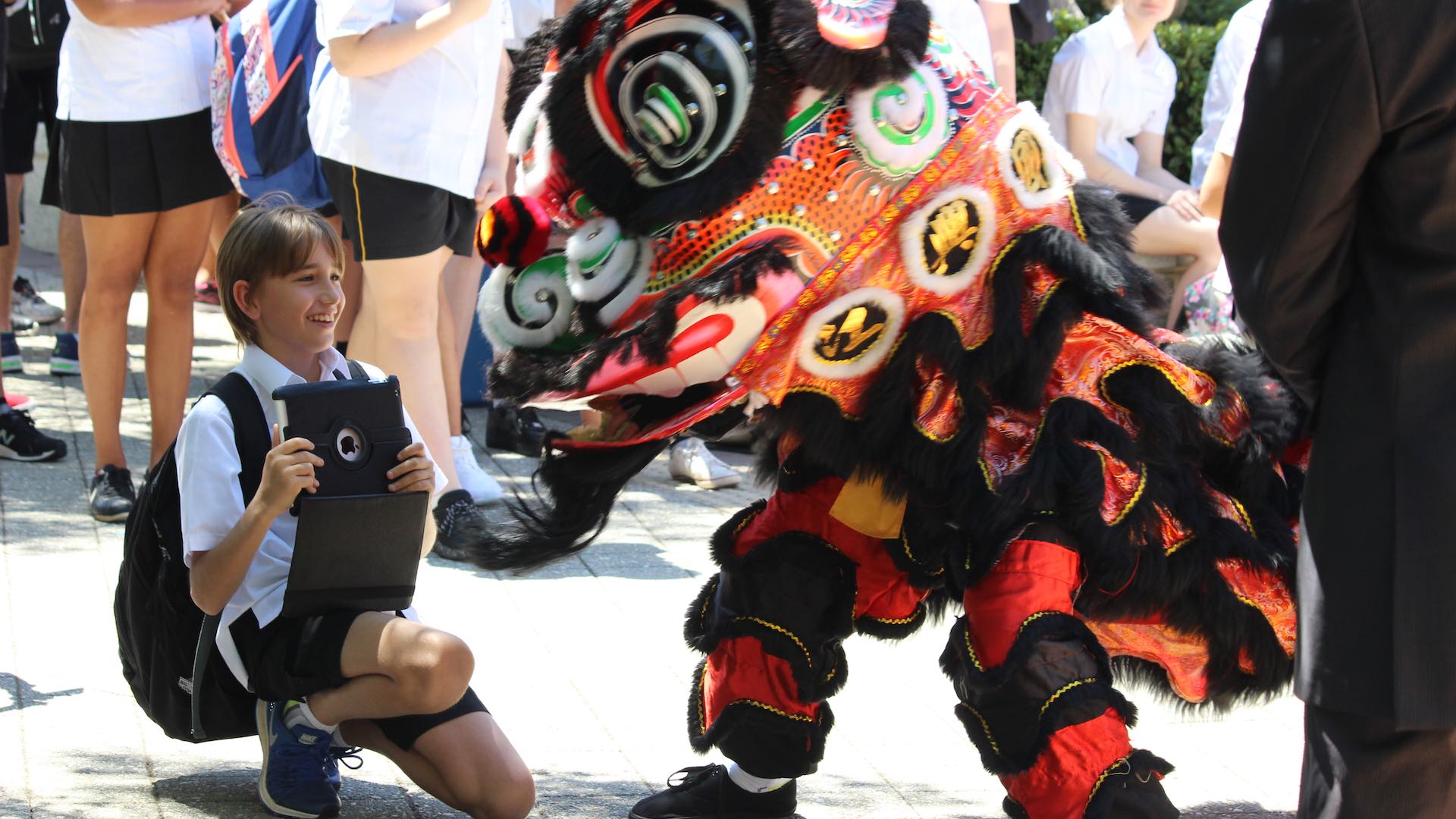
A biannual exchange program exists with our students travelling to China to visit our Sister school, No. 7 School in Hangzhou. There is also preliminary planning for a potential cultural immersion tour to the exquisite and amazing parts of Italy in September 2017 for Italian studies students. Art, language, geography, cuisine, history, sport, everyday living, adventure and romantic icons are just a few areas students will study.
Our enthusiastic staff are great ambassadors for language learning and their passion to promote languages in each child and the wider community is infectious. Join us to open your world to Languages. There is so much to gain!
International exchange
At Melville Senior High School we have a strong link with many countries. There are opportunities to host students and be an exchange student in other countries. Our exchange links are with China and Italy.
China: No 7 High School
No. 7 High School is a Specialist Arts school and has a natural link with the high caliber arts programs at Melville SHS. The relationship includes teacher and student exchanges, the opportunity to communicate and share languages plus exhibit each other’s artwork. In 2015 and in 2017, students and teachers went to China to visit our sister school No. 7 High School in Hangzhou, Zhejiang Province and there were reciprocal visits from their school later in the same year.
The No. 7 High School’s website is HERE
Italy
Two Italian exchange students come to Melville Senior High School each July and August. Thanks to our host students from Melville SHS, they have a wonderful place to stay each year. Students can then have a similar experience in Italy over the Christmas holidays.
Mathematics at Melville
At Melville Senior High School, we are constantly looking to the future and the skills our students need. We are the ‘M’ in STEM, and play a role in all areas of study and careers through the development of skilled, logical thinkers. Mathematics is a subject to explore and enjoy and the teaching team of qualified and enthusiastic educators work towards assisting students in achieving the success of which they are capable and deserve. Our emphasis on logical thinking and problem-solving, reflecting the requirements of The Western Australian Curriculum, aims to provide opportunities for skill development and understanding of applications of mathematical techniques.
Please read the document below for more information on areas of Mathematics addressed in the different year groups at Melville Senior High School.
Melville SHS believe it is vital that all students should receive a solid grounding in Science, enabling them to function in a world that is increasingly shaped by its application in nearly every aspect of daily life. We aim to excite all students with a sense of wonder, optimism and enthusiasm for this subject that will last the rest of their lives.
Science provides opportunities for students to develop an understanding of concepts and processes, the practices used to develop scientific knowledge, science’s contribution to our culture and society, and its applications in our lives. The curriculum supports students to develop the scientific knowledge, understandings and skills to make informed decisions about local, national and global issues and to participate, if they wish, in a science-related career.
Our curriculum in Years 7, 8, 9 and 10 is closely aligned to the Department of Education’s Western Australian Curriculum. This has three interrelated strands: Science Understanding, Science as a Human Endeavour and Science Inquiry Skills.
In Year 11, Unit 1 and Unit 2 in Chemistry, Physics, Biology and Human Biology are offered. These all lead to Units 3 and 4 and WACE examinations in Year 12. General Human Biology Units 1 and 2 are also offered in year 11, and Units 3 and 4 in Year 12.
All courses are designed to comply with the School Curriculum and Standards Authority guidelines on assessment and content.
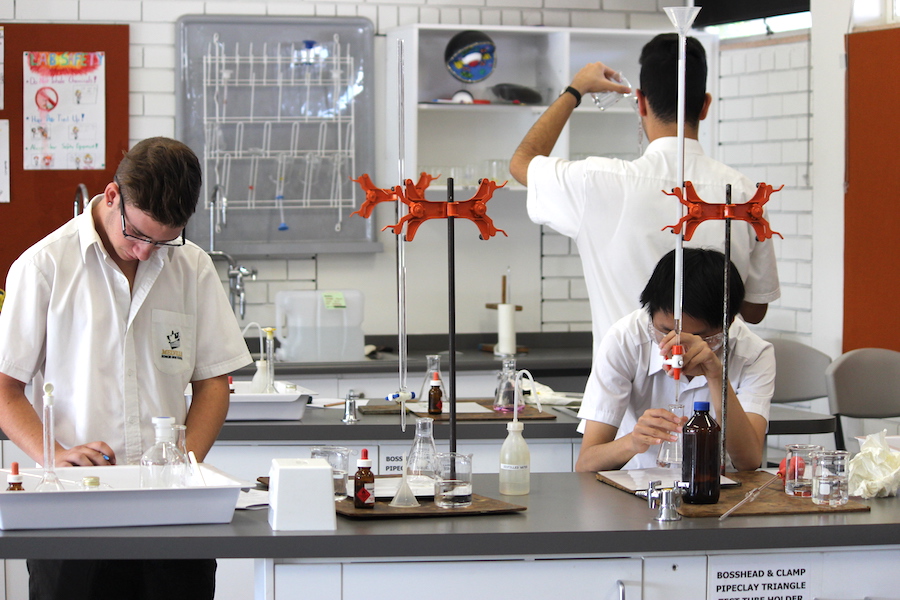
Technologies involves designing and producing innovative and creative products to satisfy human needs and wants, extending capabilities, realising opportunities and identifying sustainability issues and consequences. The subject is a broad field of study that draws on various subjects, including:
- Food Technologies
- Textiles
- Materials Design
- Digital Technologies
- Digital Engineering
- Aviation Studies (Approved Specialist Program)
Studying Technologies provides students with opportunities to:
- respond to design tasks by following the design process to ideate and create products or services using a variety of materials, techniques, processes and tools
- explore and evaluate new and innovative products and designs
- manage technological processes in an efficient, appropriate and safe manner
- evaluate and reflect on the functionality and impact of products and how well they meet the consumer’s needs and wants.

Vocational Education and Training (VET) courses can contribute up to 50 percent of the Western Australian Certificate of Education whilst providing a wide range of post-school options and pathways. VET also enables students to gain nationally recognised industry skills whilst attending school. Melville Vocational Program has been ranked in the top VET schools for the past 10 consecutive years and continue to set new records for the number of students taking up the opportunity to participate in training.
The VET Connect Program endeavours to assist students aiming for TAFE entry, apprenticeships, employment, or those who would like to use the VET program as an alternative entry pathway to some Universities. The program offers a joint school, industry and training partnership, with students working towards secondary graduation while gaining valuable workplace learning.
Benefits include recognition and accreditation for school studies when enrolling in TAFE courses, an opportunity to experience the world of work whilst still attending school, and the ability to access future career pathways early. Students also gain a unique opportunity to investigate future career options in a practical manner whilst continuing to achieve the necessary points towards WACE achievement.
The VET Connect Program requires students to attend school three days per week (Monday to Wednesday) while spending the remaining two days in a work placement and/or TAFE. Certificates completed at TAFE/School and Workplace Learning are all School Curriculum and Standards Authority (SCSA) accredited and will count towards the WACE, just like other courses completed at school. Students can select from approximately 60 TAFE qualifications, as well as select from one qualifications delivered at Melville.
The availability of external courses is subject to the external Training Provider providing a venue and lecturer. The venues for some of the training programs require the student to travel a considerable distance. The school cannot guarantee that all students will achieve a place in their chosen qualification. If students are not successful in achieving an external training placement, they will be required to complete a second day of workplace learning.
Melville also provides students with the opportunity to undertake Fee for Service certificates through either the Fremantle Education Centre or Health Science Hub. Corticates completed through these Registered Training Providers will occur costs that will be passed onto parents.
Students participating in the VET Program are required to complete Workplace Learning. This is a SCSA endorsed program that provides students up to four unit equivalents towards their WACE/WASSA. This highly successful program allows students to experience a number of work placements. This experience is invaluable, and many past students have gone on to gain employment or apprenticeships as a result of the networks they made and the skills they developed in the ‘real world’.
The VET Program is a viable and alternative entry pathway to university. Certificate IV meets entry for 70 Selection Rank Courses at some Universities, provided English Language Competency requirements and the related criteria are met. This alternative university pathway has become very popular with students. It allows them to access courses and workplace learning in a particular field related to their university aspirations while still at school. For others, it assists them in making a more straightforward decision on what to study at university. For specific information related to alternative entry pathways to university, please access detailed information on the university websites.
The VET Connect Program is a discrete program which is independent of the main timetable.
Courses undertaken include:
- General English
- General Career and Enterprise
- General Mathematics Essential
- General Physical Education
- Certificate II in Skills for Work and Vocational Pathways
- Authority-Developed Workplace Learning (ADWPL) – endorsed program
- Certificate II or higher delivered externally at an offsite location
Vocational Pathway Student Timetable Sample:There is a separate application process to apply for the VET program, and students must meet the selection criteria. Places are limited, and students need to be considered as suitable for the program.
In selected industry areas, students may be eligible to complete a qualification under a School-Based Traineeship (SBT), School-Based Apprenticeship (SBA) or Pre-Apprenticeship in Schools Program (PAiS).
Detailed information regarding the above programs can be found in the Subject Selection Handbooks located HERE.
VET Mainstream – (General)
Students that do not wish to undertake the Vocational Pathway Program but wish to study mainstream ‘General Pathway’ are also able to undertake certificate courses at on off-site location. This enables students who have specific interests to pursue a career through courses not usually available to them at school. Students attend school for four days per week and spend one day in external training provider. Students are required to study five subjects rather than six subjects and are expected to use those periods where they do not have an allocated class to catch up on the work missed whilst attending their VET one day certificate program.
Students require ‘special consideration’ to undertake an external course at TAFE/Private Registered Training Organisation (RTO) or a School-Based Traineeship (SBT), where they are not able to be enrolled in the Vocational Pathway Program at school. A limited number of places are approved, and students need to meet selection criteria which demonstrates a capacity to undertake an external course.
ATAR students will not qualify for the due to the requirement to miss one day of school per week. However, a student with one ATAR course can apply if their ATAR course is not timetabled or impacted on the external training day.
Students completing a Certificate IV will find themselves well-placed for entry to TAFE for further training or alternative university entry.
Student Timetable Sample:
Students in the program retain all five courses at school and will be required to catch up on missed work from the training day.
Qualifications and application details can be found in the Subject Selection Handbooks located HERE.
School-Based VET Programs
School-based VET programs are delivered on the school site as part of a student’s regular timetable. All programs involve a partnership between Melville SHS and Registered Training Organisations so that students can achieve a VET qualification that is delivered at school as part of a student’s Year 10/11 and or Year 12 course selection.
Melville Senior High School has partnered with the following RTOs to deliver the qualifications listed below through an auspice arrangement:
IVet
– RTO # 40548
BSB20120 Certificate II in Workplace Skills
https://training.gov.au/Training/Details/BSB20120
BSB40215 Certificate III in Business
https://training.gov.au/Training/Details/BSB30120
SIS20321 Certificate II in Sports Coaching
https://training.gov.au/Training/Details/SIS20321
SIS20321 Certificate II in Sports Coaching – Netball
https://training.gov.au/Training/Details/SIS20321
FSH20119 Certificate II in Skills for Work and Vocational Pathways
https://training.gov.au/Training/Details/FSK20119
Students who have been assessed as meeting the requirements of the training package will be issued with an AQF Certification by iVET.
AIET
– RTO # 121314
MEM20422 Certificate II in Engineering Pathways
https://training.gov.au/Training/Details/MEM20422
Students who have been assessed as meeting the requirements of the training package will be issued with an AQF Certification by AIET.
COSAMP
– RTO # 41549
CUA20620 Certificate II in Music
https://training.gov.au/Training/Details/CUA20620
CUA30920 Certificate III in Music [Performance]
https://training.gov.au/Training/Details/CUA30920
CUA20120 Certificate II in Dance
https://training.gov.au/Training/Details/CUA20120
CUA20220 Certificate II in Creative Industries
https://training.gov.au/Training/Details/CUA20220
CUA31020 Certificate III in Screen and Media
https://training.gov.au/Training/Details/CUA31020
Students who have been assessed as meeting the requirements of the training package will be issued with an AQF Certification by COSAMP International.
Tutoring
Melville SHS offers a tutoring discount with Academic Task Force. Click here for more information.
Academic Task Force has worked with schools and families for 28 years. It is one of the most experienced Year 11 & 12 education providers in Western Australia.
Whether you are a high achiever looking to get that extra edge or a student who would like additional support to reach your potential, Academic Task Force has a program to suit you. Many of our teachers have experience as Heads of Department, and are WACE markers or text book writers, so they know the syllabus well and can help you understand the content.

